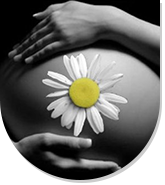Midwives Model of Care
The Midwives Model of Care™ is based on the fact that pregnancy and birth are normal life events. The Midwives Model of Care includes:
Monitoring the physical, psychological and social well-being of the mother throughout the childbearing cycle.
Providing the mother with individualized education, counseling, and prenatal care, continuous hands-on assistance during labor and delivery, and postpartum support.
Minimizing technological interventions and;
Identifying and referring women who require obstetrical attention.
The application of this model has been proven to reduce to incidence of birth injury, trauma, and cesarean section.
The Midwives Model of Care definition above is Copyright © 1996-2001, Midwifery Task Force, All Rights Reserved.

Midwifery
Throughout most of the world, and most of history, women have labored and birthed with midwives. It is only in the last few decades that it has become common in the U.S. to birth in a hospital setting with a doctor. Being pregnant and giving birth are normal life processes for which a woman’s body is well-designed. Midwifery care has been proven to be a safe and nurturing alternative to physician-attended hospital birth.
The Midwives Model of Care™ is a fundamentally different approach to pregnancy and childbirth. Midwifery care is uniquely nurturing, hands-on care before, during, and after birth. Midwives are health care professionals specializing in pregnancy and childbirth who develop a trusting relationship with their clients which results in confident, supported labor and birth.
While there are different types of midwives practicing in various settings, all midwives are trained to provide comprehensive prenatal care and education, guide labor and birth, address complications, and care for newborns.
